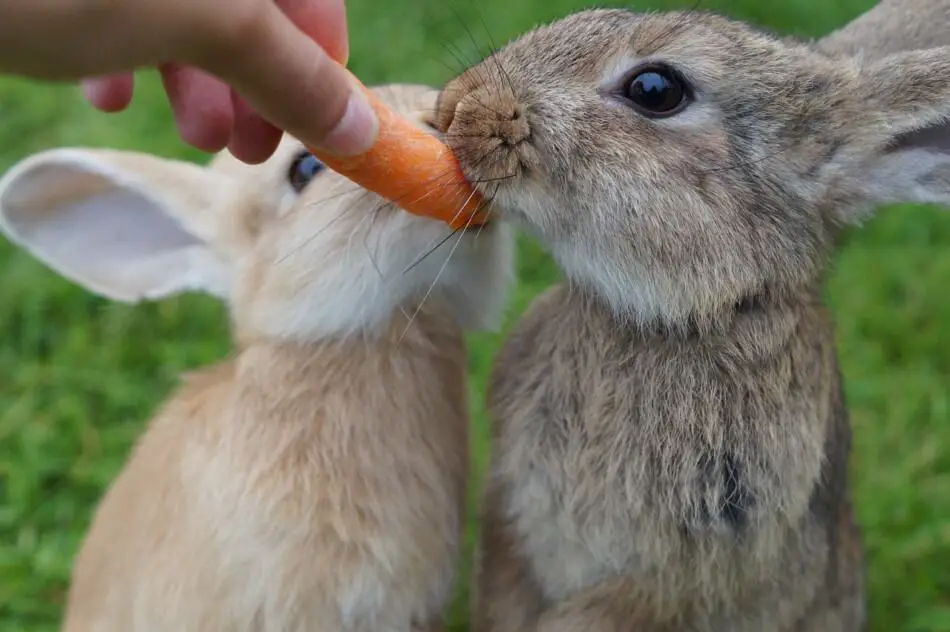Rabbits are relatively low-maintenance pets. They are friendly when they are happy, and a healthy, well-adjusted rabbit will be glad to socialize. Rabbits are also independent creatures. They are bright and alert and can entertain themselves easily. In this article, we address the question ‘What do rabbits eat and drink?’.
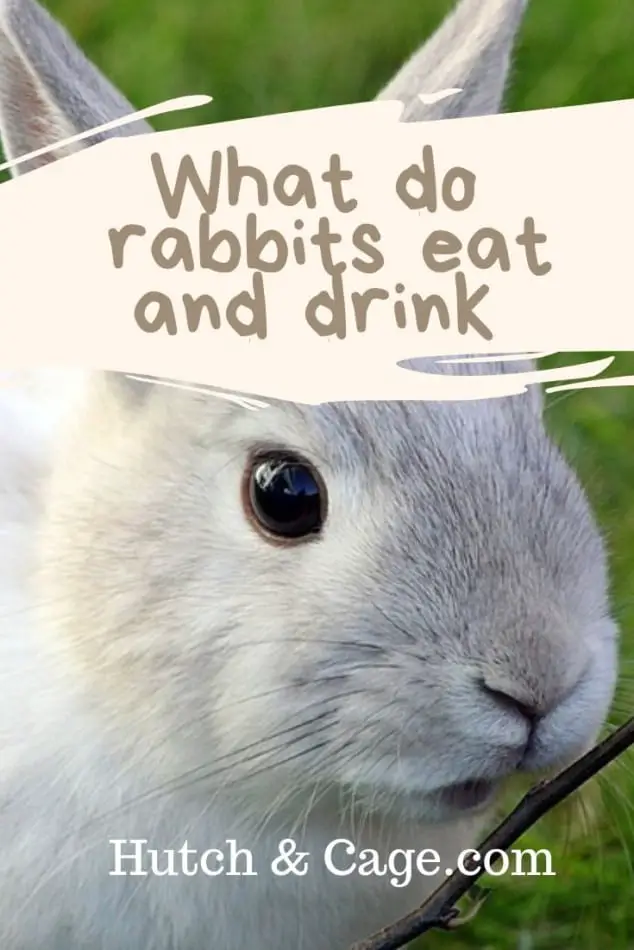
What do rabbits eat and drink? Rabbits diet consists of 90% Fiber. Rabbits can eat hay, pellets, rabbit flakes and other treats. They have a unique organ called the “cecum”, which serves the purpose of breaking fiber down into fat and nutrients. Rabbits will drink most liquids. However, not all liquids are suitable for them to drink. Water is the best option for rabbits to drink.
Table of Contents
Rabbits Must Be Fed Carefully
These gentle creatures have a very sensitive digestive system, which can easily be thrown out of whack. Knowing what rabbits eat and drink is paramount to their health, happiness, and longevity.
In the worst case scenario, a rabbit which ingests improper foods will develop what is called gastrointestinal stasis. This is a life-threatening condition which calls for veterinary attention immediately.
Luckily, it is quite simple to eliminate the risk of food-related ailments and discomforts in rabbits. All you need is a bit of know-how.
What To Feed Your Bunny
Rabbits subsist almost entirely on fiber. They possess a unique organ called the “cecum,” which serves the purpose of breaking fiber down into fat and nutrients. Rabbits then absorb these.
A little known fact about rabbits is that their teeth are growing constantly. Because of this, rabbits must chew frequently, in order to grind their teeth down and keep them manageable. This means that food should be available for your rabbits at all times – 24/7!
Rabbits Should Eat 80-90% Hay
In the wild, the diet of a rabbit is comprised primarily of hay. The plant is plentiful and rich in fiber, and rabbits seem to savor the tender stalks. Rabbits can often be seen rooting through their hay for the best pieces.
Rabbits should have access to hay all day, every day. They are very active. Naturally, they spend a large portion of their time grazing. Munching on hay and greens is the main way that rabbits entertain themselves. The little grazers can while away hours searching for the tenderest bits of hay.
We use Kaytee hay for all our rabbits, it’s really good quality. But don’t take our word for it. Read what real customers on Amazon have to say about it here!
Rabbit Pellets Are A Good Diet Supplement For Rabbits
Just be sure to choose pellets that are fresh, high in fiber, and low in protein. Avoid additives. Pellets can be a nice addition to the diet of any rabbit and can offer variety and some additional nutrients. You can offer pellets to rabbits in a small percentage, keeping in mind that hay should still make up 80-90% of what they consume.
We feed our rabbits Kaytee Rabbit Pellets which we purchase directly from Amazon. Kaytee Fiesta food is a premium fortified blend of fruits, vegetables, seeds and grains offering maximum variety, fun and nutrition for all small animals. With prebiotics and probiotics to support digestive health in young and adults rabbits alike. Suitable for all sizes and ages.
Treats are highly recommended for any pet! This will give them a burst of endorphins, which can improve their overall mood throughout the day. Your rabbit is sure to thank you for the surprise.
Like All Animals, Rabbits Love Treats
Among animals of all kinds, gifts of food are meaningful. Cats leave their kills for humans to show their regard, for example. Treats are a fantastic way to bond with your bunny. Any positive associations you can build will help you earn their trust and friendship, ultimately.
Fact: 73% of a rabbits body is made up of water. No wonder they love to drink so much water!
The treats at the store are high in sugar and therefore unhealthy. You will not be doing your rabbit any favors with these. Instead, give them fruit and other healthy snacks. Rabbits actually prefer these things, as they are something they eat more naturally.
Fruits Are The Ideal Rabbit Treats
Some great choices of rabbit treats are fruits, like apples, bananas, strawberries, and raspberries. Do not overdo treats, of course; you want the sugar levels in your rabbit to remain steady.
When it comes to bananas, feed a rabbit a piece no larger than a man’s thumb.
Remove seeds from apples before you offer them to your rabbit, as apple seeds contain a poisonous chemical called arsenic. Feed your rabbit no more than a couple of apple slices at any time.
Strawberries, whilst not toxic to rabbits, when fed in large quantities can lead to weight gain or cause serious gastrointestinal problems. As with all treats, strawberries should be limited to two tablespoons, chopped. They should not be fed to your pet every day; twice a week is sufficient.
Raspberries are similar to strawberries regarding quantities and methods of feeding as a treat to your rabbit.
Use your better judgment when it comes to treats, offering them in the advised portions. Most rabbits can tolerate 1-2 tablespoons a day. Observe your rabbit to see how fruit affects them; if they seem bloated or sick at all, reduce the amount accordingly.
Using treats as a training technique or as a delicious tidbit to keep your bunny happy, it is strongly recommended not to overdo treats. Whilst these treats do fall into the category what rabbits eat and drink, they should not constitute more than 10% of the overall diet.
Read our complete rabbit guide if you would like other information on how to keep pet rabbits. Packed with helpful information and tips.
Vegetables Make Fantastic Rabbit Snacks
It comes as no surprise that rabbits love vegetables. Many vegetables can make a wonderful and tasty snack. Others are toxic to rabbits and can make them sick, even fatally. Some vegetables will merely give your rabbit gas, for example, while others can cause breathing troubles and even heart failure.
This means it is very important to identify and memorize which vegetables are poisonous, and which are rabbit-safe. To get you started, the following are some common vegetables (and fruits) in the list of what rabbits eat and drink. Learn which can prove dangerous to your fluffy friend, and which are healthy.
One of the best rabbit snack is Celery
Celery is chock-full of fiber, and this makes it ideal for rabbits. Rabbits can consume the leaves and stalk alike. Along with fiber, celery is made up of water and will help keep your bun hydrated and healthy.
Wheatgrass is a Healthy Choice for Rabbits
Wheatgrass is a healthy choice for rabbits
Most rabbits love to eat wheatgrass, and it can certainly make a good option for a snack. Just as they do with hay, rabbits will root about for the tastiest parts, which will keep them occupied happily.
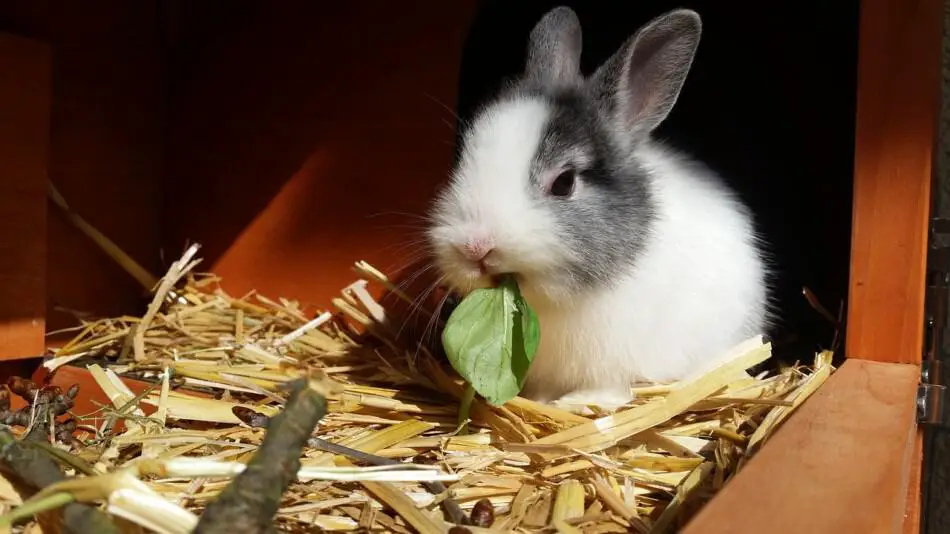
Rabbits like Bok Choy in small amounts
Bok choy is a healthy, fibrous plant which rabbits are known to enjoy. As with all vegetables, use bok choy as a supplement to their usual fare. Some rabbits experience gas and general abdominal discomfort as a result of consuming bok choy.
Watch for symptoms such as this, and decrease the portion of bok choy in the future or cease feeding it to them entirely. Like humans, rabbits are individuals, and so food affects them differently. Observe what foods your rabbit may not prefer, and which are their favorites.
Sprouts are a nutritious rabbit snack
There are nutrients and hydration aplenty in sprouts. This makes them a great choice for a rabbit snack. Let your rabbit give brussel sprouts a try.
Something to keep in mind is that many animals, including rabbits, require lots of water to keep their kidneys healthy. Kidney failure is one of the first things that elderly animals tend to experience.
Alternately, by ensuring that your bunny eats plenty of water-rich foods, you can help increase their longevity. Access to clean, fresh water every day is key.
Squash can make a tasty treat For rabbits
Rabbits can eat a variety of squash. In fact, they seem to adore squash. They will not know when to stop eating it, so it is important that you portion it out accordingly. A piece no larger than a grown man’s thumb will suffice. Do not feed your rabbit any more than this, and no more than once every few days, as squash is high in both sugar and starch. An excess of these in the system of a rabbit will affect them harmfully.
Rabbits can eat carrots
In the wild, rabbits do not generally eat root vegetables, including carrots. They can eat carrots as a treat in captivity. Use standard store-bought carrots rather than wild carrots, as the latter are less healthy and can even do harm to a bunny.
As with any rabbit-safe vegetable, feed no more than 1-2 tablespoons daily. 1 tablespoon of carrots is probably plenty. Carrots are high in sugar and starch and should be fed as a treat only.
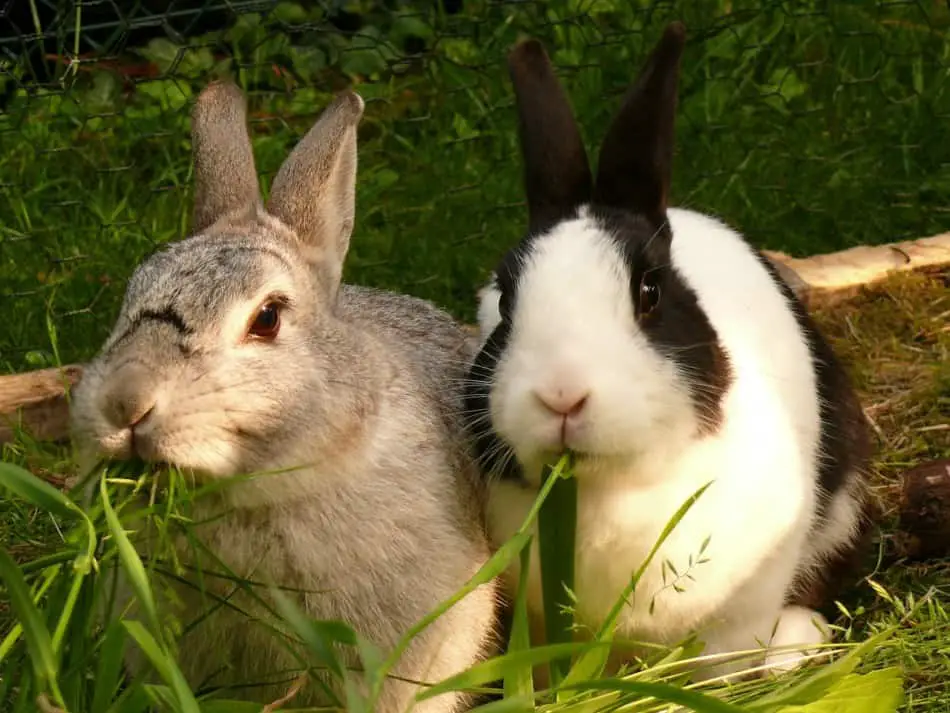
The Diet Of A Rabbit Should Change As They Age
What do rabbits eat and drink as they age? Like most animals, rabbits require a slightly different diet at different stages of their lives. High-quality pellets (ensure that they are at least 18% fiber; the more the better, within reason) should be fed to young rabbits primarily. As a rabbit reaches adulthood, offer fewer pellets and gradually switch them to alfalfa and hay.
Young rabbits can get a lot of benefit from rabbit pellets, as they are high in fiber, nutrients and calories. Adult rabbits can also benefit from pellets to a degree. Feeding an adult rabbit too many pellets can result in obesity. Always feed an adult rabbit 80-90% hay.
What And How To Feed A Baby Bunny
Should you happen to find or adopt a baby rabbit, you must feed them specially. A baby rabbit requires kitten milk from the store or goats milk. Some suggest adding a bit of heavy whipping cream to imitate rabbits milk, which is very rich in calories.
It is strongly recommended to add acidophilus to the formula, too. Baby bunnies are at an even greater risk than adults of unhealthy gut bacteria, and acidophilus will help prevent this effectively. Add as directed, and only in little bits, so that it is not too hard on their tummy.
Take care when feeding a baby rabbit, and do not force milk down their throat. This can cause the liquid to go into the lungs. Instead, if your baby bunny is not receptive to a bottle, which does happen sometimes, try a sterile oral syringe. Once again, be very gentle while feeding a rabbit from a syringe. Let them go at their own pace, and make sure they swallow correctly.
At about 7 months, rabbits should be consuming alfalfa and then gradually Timothy and Oat hay as they reach maturity.
What Not To Feed Your Bunny
Now you know what rabbits eat and drink, it is equally important to know what to avoid feeding to your bunny. Surprisingly, there are many seemingly harmless fruits and vegetables that can make your rabbit sick. You must be aware of these in order to save your rabbit from a tummy ache, or much worse.
Read our article on the 10 Most Toxic Foods For Rabbits!
Avocado is deadly to rabbits
To rabbits, avocados are poisonous inside and outside. The skin serves as no protection, as it is even more poisonous than the flesh. Rabbits are curious critters, and while avocados are by no means a natural food for them, a domestic rabbit may be tempted to give it a try.
This more often than not has devastating consequences. These can range from behavioral changes to breathing troubles to heart failure. This is due to a chemical in avocados called “persin,” which to rabbits, is toxic.
Needless to say, keep avocados up high and far away from your bunny.
Onion is toxic for rabbits
Almost as deadly as avocados, onions can also have a fatal effect on rabbits. Should they come into contact with an onion, a rabbit can go into anaphylactic shock. Should a rabbit consume onions, they become at serious risk for a life-threatening condition called Hemolytic Anemia. As a member of the onion family, garlic is also harmful.
These are plants which rabbits do encounter and know to avoid in nature. With a domesticated rabbit, however, there is a risk that they will indulge their curiosity.
If your rabbit goes into your backyard, and you have onions, garlic or the like, be sure to fence the area off completely. This is the only sure way to keep your rabbit safe.
Apple seeds can harm rabbits
Most people know that apple seeds are toxic in large amounts. Humans are big enough that this is not as much of a concern for us. Rabbits are tiny in comparison, so the small dose of arsenic in apple seeds can affect them much more seriously.
Before feeding a rabbit an apple slice or core, be sure to empty it of seeds thoroughly. Then, as an occasional treat, the apple will be rabbit-safe.
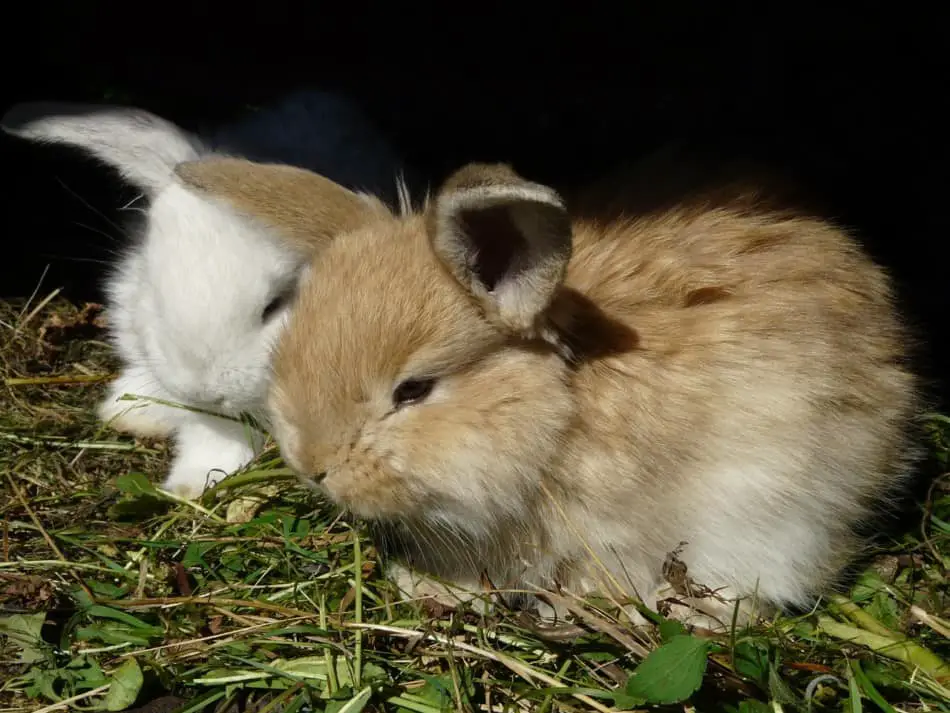
Rabbits cannot digest corn hulls
A “hull” is the name for a corn shell. While corn is not strictly poisonous to rabbits, it can have deadly effects all the same. Upon ingesting corn, rabbits become at risk for the hulls becoming lodged in the digestive tract and creating a blockage. This can cause serious complications. Gastrointestinal stasis can even be caused by corn hulls. Corn should not be fed to rabbits in any degree, ideally.
Never feed meat, eggs or dairy to your bunny
While humans and many creatures are omnivores, rabbits are obligate herbivores. This means that they can only eat plants. Their bodies are not made to digest animal products, whether it be meat, eggs or dairy.
Should you try to feed a rabbit any of these foods, you will doubtlessly make them very sick. Most rabbits will turn their noses up to anything other than good old-fashion greens anyway.
Still, if there is a salad with ranch dressing or something similar around a bunny, they may give it a try, with disastrous consequences. Keep any foods containing meat, eggs or dairy out of their reach.
Chocolate is poisonous to rabbits
While chocolate is a decadent treat for humans, the bitter cocoa bean is actually poisonous to most animals. This is due in large part to the caffeine that is found in chocolate naturally.
While a piece of chocolate and even a chocolate bar contains a very small dose of caffeine for a human, in rabbits, the dose is large enough to kill. The excess of caffeine can all too easily cause a heart attack.
Chocolate also contains theobromine, which, to rabbits, is extremely toxic.
Bread, pasta and crackers can cause Enterotoxemia in rabbits
Foods such as bread, pasta and crackers are immensely high in carbs. This translates to a lot of sugar. Compared to the amount of sugar in these foods, the portion that is fiber is relatively low. This means that not only will rabbits fail to find sustenance in them, but the sugar, unhindered by fiber, will hit their system quickly, and hard.
Enterotoxemia is typically the result: a condition whereby there is an excess of harmful bacteria in the intestinal tract of a bunny. Should the bacteria go unchecked, this can all too swiftly lead to the shutdown of the rabbit’s digestive system. This is of course deadly.
Store bread, pasta, crackers, and any other high carb foods (like chips or candy) in a place that is well hidden from your bunny.
Nuts are not good for rabbits
While not necessarily toxic or deadly, nuts are not nutritious for rabbits. In fact, nuts have a great deal of fat in them. With their diet of hay, alfalfa, and grass in the wild, rabbits do not usually ingest a lot of fat directly. Because of this, the high-fat content in nuts can cause rabbits some digestive difficulties.
Moderate to large amount of nuts are sure to make a bunny sick. Some nuts, like macadamia nuts, may even prove toxic. There are a lot of foods that could serve them better, in summary!
Cauliflower causes most rabbits to suffer bloating and the like
Another food, although not too high on the toxicity scale, cauliflower can still do your rabbit harm. This vegetable is known to cause abdominal distress in rabbits, including bloating, cramps, nausea, and related symptoms. Clearly, this does not make for a happy bunny.
Peas are a high sugar vegetable and can harm rabbits
While rabbits can eat plenty of vegetables, there are a few they should have in only tiny servings or avoid entirely. One of these vegetables is the pea. While peas do contain an okay amount of fiber and are not technically toxic, they still contain a high amount of sugar for a vegetable. In over-large portions, this can wreak havoc on a rabbits tummy. You may wish to instead offer one of the recommended foods.
Rabbits Should Drink Plenty Of Water
In our quest to explain what rabbits eat and drink, we must include an explanation about your bunny’s liquid intake.
Like most living creatures, rabbits require plenty of fresh water. They should have access to water at all times. While some opt for sipper bottles for their rabbits, most rabbits, in fact, prefer water bowls. Since this is most often their preference, a bowl may encourage them to drink more frequently.

Fluids other than water should not be offered to rabbits. Juices are incredibly high in sugar, and empty of fiber, virtually.
The only fluid other than water that ought to be offered to a rabbit is kitten milk or goat milk, and this only for the babies. An adult rabbit should drink nothing other than good, clean water.
The water bowl of a rabbit should be refreshed daily. Bowls should be washed with soap daily or every other day.
We use the gravity fed water bowl from Petmate. Read what customers over on Amazon had to say about it. Click here!
Conclusion: What Do Pet Rabbits Eat And Drink?
Now you know what rabbits eat and drink and know what to feed and how to feed rabbits of all ages! While it is true that rabbits should be fed mostly hay, do not be afraid to treat them every once in a while. Simply make sure that the treats are verified to be rabbit-safe, and in the proper amounts.
A well-fed rabbit will have a glossy coat, a plump body, bright eyes, and a perky personality. Feed your rabbit right to help them thrive, and they will be your grateful and loving companion for years to come.

